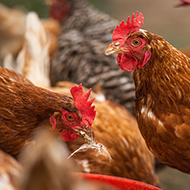
Pirbright's novel vaccine found to increase effectiveness.
Research has revealed further benefits associated with a new avian flu vaccine developed by The Pirbright Institute.
Alongside being easier and less costly to produce than traditional avian flu vaccines, researchers have discovered further benefits from the new vaccine.
In a study published in npj Vaccines, scientists report that this new vaccine could avoid interference from maternal antibodies, which can make chicks more susceptible to disease.
This is a significant discovery, as chicks are usually vaccinated one day after they hatch, when maternal antibodies are strongest, but this novel vaccine will not decrease in effectiveness, as traditional vaccines would.
Head of Pirbright's Avian Influenza Virus group, Professor Munir Iqbal, said: “This research highlights the importance of improving vaccine development which will reduce disease and improve animal welfare.
“Targeted antigen delivery vaccines have the potential to be the next generation of poultry vaccines as they generate powerful immune responses which protect chickens and reduce the risk of avian influenza spreading to humans.
“Furthermore, overcoming maternal antibody interference is important for disease control and will ensure that all chickens are protected once they hatch. Further studies will focus on testing the effectiveness of this vaccine in the field to ensure it can be applied to real life poultry production.”



 The Federation of Independent Veterinary Practices (FIVP) has announced a third season of its podcast, Practice Matters.
The Federation of Independent Veterinary Practices (FIVP) has announced a third season of its podcast, Practice Matters.